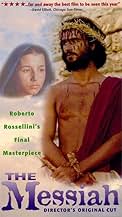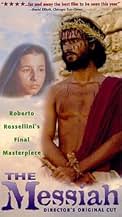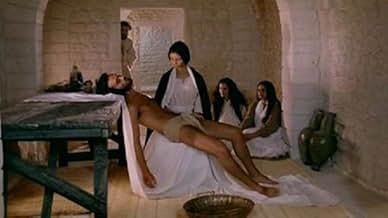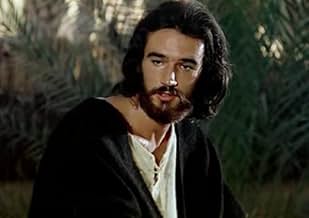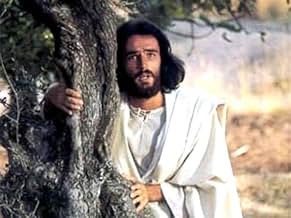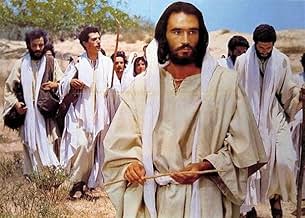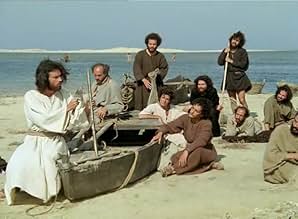Füge eine Handlung in deiner Sprache hinzuThe story of the life of Jesus Christ.The story of the life of Jesus Christ.The story of the life of Jesus Christ.
- Regie
- Drehbuch
- Hauptbesetzung
Empfohlene Bewertungen
It is a Rossellini. You feel it scene by scene. Different by other Jesus portraits, it represents the honest - precise portrait of great teacher. The words are fruit of work of hands. The message is simple and the sacrifice propose a special form of reddemption.
Sure, at the first sight, after the gallery of portraits of historical personalities, the temptation is to believe than Messiah is just a piece from the chain.
Obvious, it is more. The portrait of Saint Mary, the solutions for Passion and Resurrection or for the grave of Lazarus, the silence and calm respired by the film, the mathematical demonstration of the presence of Jesus, the eliptic speech about Him , the status of hakawati of the Savior , the reference to Pietta by Michelangelo are just proves of this.
Provocative in personal way.
Dialogue with the viewer.
Far by blockbusters about same theme.
Wise perspective about The Savior .
Not impressive. Useful is enough.
So, a form of last word of a great director.
Sure, at the first sight, after the gallery of portraits of historical personalities, the temptation is to believe than Messiah is just a piece from the chain.
Obvious, it is more. The portrait of Saint Mary, the solutions for Passion and Resurrection or for the grave of Lazarus, the silence and calm respired by the film, the mathematical demonstration of the presence of Jesus, the eliptic speech about Him , the status of hakawati of the Savior , the reference to Pietta by Michelangelo are just proves of this.
Provocative in personal way.
Dialogue with the viewer.
Far by blockbusters about same theme.
Wise perspective about The Savior .
Not impressive. Useful is enough.
So, a form of last word of a great director.
Dubbed "the most Catholic of all film directors" by one critic, I guess it was only a matter of time before Roberto Rossellini tackled the life of Christ on celluloid. Ironically, this he did in what proved to be his last feature film which was, in itself, a follow-up to his TV mini-series ACTS OF THE APOSTLES (1969). That earlier work was interesting for treating little-known passages from the New Testament but, with an unhurried pace and a generally unassuming tone, the end result was decidedly meandering. Conversely, THE MESSIAH presents all-too-familiar events with the overall effect feeling lengthy still, yet distinctly more cinematic. That said, it starts off with the arrival of the Jews in the Promised Land and the appointment of their first king (Saul) before moving on to the life of Christ; actually, this is also one of the few films to show the famous incident in which Jesus is lost in the temple as a boy. Unsurprisingly, it doesn't stray much from the spirit or word of the Gospels: even so, in the throes of an agonizing death, Herod The Great (played by Vittorio Caprioli though his trademark flustered demeanor is downplayed by having his voice dubbed) is seen planning the annihilation of his own subjects akin to the practice of ancient Egyptian rulers!
Incidentally, the rich and commanding voice of Christ himself is supplied by Enrico Maria Salerno a superb actor in his own right who had actually already handled the very same task in THE GOSPEL ACCORDING TO ST. MATTHEW (1964) which is effectively contrasted with the inconspicuous appearance of the young man who appears in the role (perhaps best approximating the Lothaire Bluteau of Jesus OF MONTREAL [1989]). This Messiah, then, is far removed from the striking good-looks of Jeffrey Hunter (KING OF KINGS [1961]) and Robert Powell (the Jesus OF NAZARETH [1977] TV mini-series) or the brooding power of Max von Sydow (THE GREATEST STORY EVER TOLD [1965]) and Willem Dafoe (THE LAST TEMPTATION OF Christ [1988])! Naturally, the bulk of the narrative is devoted to Christ's public life though no overdue emphasis is placed on the miracles he performed (these are mentioned but rarely seen) which also provides the film with its essential core since the latter section, revolving around the more commonly-depicted events of Jesus' trial (where Jean Martin, the French Colonel in THE BATTLE OF ALGIERS [1966], nonetheless makes for a fine Pontius Pilate), crucifixion and eventual resurrection are curiously skimped here!
The subplot involving John The Baptist, however, is quite nicely handled; by the way, the only other recognizable face in the cast is that of Tina Aumont (even if her contribution amounts to no more than a few minutes of screen-time!) as the adulteress Christ famously pardons by denouncing her pursuers instead. The score is, once again, by Mario Nascimbene though it's not as prominent as his work on ACTS OF THE APOSTLES. On the visual side, the film seems closest to the contemporaneous Jesus OF NAZARETH yet the lyrical style and quiet dignity on display makes of THE MESSIAH a more than worthy companion piece to Pier Paolo Pasolini's aforementioned (and more renowned) THE GOSPEL ACCORDING TO ST. MATTHEW. With this in mind, while perhaps not the definitive film on the subject, it certainly emerges as an underrated achievement both among the myriad treatments (including those by such great directors as D. W. Griffith, Carl Theodor Dreyer, Cecil B. DeMille and Abel Gance) of Christ's life over the years and in Rossellini's own highly respected canon.
Incidentally, the rich and commanding voice of Christ himself is supplied by Enrico Maria Salerno a superb actor in his own right who had actually already handled the very same task in THE GOSPEL ACCORDING TO ST. MATTHEW (1964) which is effectively contrasted with the inconspicuous appearance of the young man who appears in the role (perhaps best approximating the Lothaire Bluteau of Jesus OF MONTREAL [1989]). This Messiah, then, is far removed from the striking good-looks of Jeffrey Hunter (KING OF KINGS [1961]) and Robert Powell (the Jesus OF NAZARETH [1977] TV mini-series) or the brooding power of Max von Sydow (THE GREATEST STORY EVER TOLD [1965]) and Willem Dafoe (THE LAST TEMPTATION OF Christ [1988])! Naturally, the bulk of the narrative is devoted to Christ's public life though no overdue emphasis is placed on the miracles he performed (these are mentioned but rarely seen) which also provides the film with its essential core since the latter section, revolving around the more commonly-depicted events of Jesus' trial (where Jean Martin, the French Colonel in THE BATTLE OF ALGIERS [1966], nonetheless makes for a fine Pontius Pilate), crucifixion and eventual resurrection are curiously skimped here!
The subplot involving John The Baptist, however, is quite nicely handled; by the way, the only other recognizable face in the cast is that of Tina Aumont (even if her contribution amounts to no more than a few minutes of screen-time!) as the adulteress Christ famously pardons by denouncing her pursuers instead. The score is, once again, by Mario Nascimbene though it's not as prominent as his work on ACTS OF THE APOSTLES. On the visual side, the film seems closest to the contemporaneous Jesus OF NAZARETH yet the lyrical style and quiet dignity on display makes of THE MESSIAH a more than worthy companion piece to Pier Paolo Pasolini's aforementioned (and more renowned) THE GOSPEL ACCORDING TO ST. MATTHEW. With this in mind, while perhaps not the definitive film on the subject, it certainly emerges as an underrated achievement both among the myriad treatments (including those by such great directors as D. W. Griffith, Carl Theodor Dreyer, Cecil B. DeMille and Abel Gance) of Christ's life over the years and in Rossellini's own highly respected canon.
10EdgarST
I do not know if I am delirious, but living in a country that has an enclave called the Vatican (in a certain way, a spiritual "Canal Zone", as the area that was under US control within the republic of Panamá until 1999) must predispose Italian artists: perhaps the Vatican inspires the most pious to exalt Catholicism, while the most progressive maybe take a more critical stance towards this ecclesiastical state-enterprise within their country. I find quite curious that two Italian non-believers and filmmakers, one Marxist and the other atheist, made two of the most interesting films I have seen about the figure of Jesus of Nazareth. First, Pier Paolo Pasolini, released in 1964 «The Gospel According to Matthew», a production that was surrounded by a controversy that finally turned into applause and praise; and the other, Roberto Rossellini, presented «Il Messia» in 1975 with less luck, to the point that the free circulation of the product had to wait almost 30 years to be (marginally) distributed. «The Messiah» is long, Brechtian, austere and intelligent; it dispenses with many biblical passages in which David W. Griffith, Miguel Morayta, Nicholas Ray, George Stevens, Franco Zeffirelli, Martin Scorsese or Mel Gibson delighted in their (kind of frivolous) versions of the Nazarene's immolation; and it introduces the story in an ingenious way: the film starts with a synthesis of the history of the Jewish people, from the arrival of the tribes to the "promised land", after 40 years in the desert, to the selection of Saul as their first king, who led the common man to war; and then proceeds with a description of the growing political and moral corruption of the tribes, a process that reached a "plot point" the day the expected Messiah appeared. As the story goes, they ended up turning their backs on the holy man and murdered him. Rossellini does not shilly-shally: he cleverly exposes the political intrigue of Pharisees and Jewish priests, who try to preserve their power without disturbing the Roman invaders that control them. Jesus is young and strong, somewhat shy, he works wood, ploughs and gleans, has mystical outbursts, preaches with metaphors to death, and knows how to debate with logical reasoning. The most difficult part of the film is the long sequence of the apostles' proselytizing campaign, as they preach the "new word", but that is the director's choice. Rossellini prefers that, to show us instead the brutal and the violent, in the best aesthetic line of a Greek tragedy, which showed not tortures, crimes or mutilations on stage. «The Messiah» saves us the lashes, the road to Golgotha, the long agony on the cross, and the miracles. The film has another agenda: to show the story of a man who confronted the corruption of power, who preached love as method, but who was paid with hatred by his own people. Rossellini does it in a realistic way, he shows things as natural and non-dramatized facts (often in long shots, with few cuts or none); the images lose that false fervor of "saint cards" that has ruined so many films about Jesus. As an example, see the sequence of the last supper, from the moment Jesus washes the apostles' feet to Judas' departure. It is just that, a last meal, a sad farewell and the leader's final instructions, and not an ornate evocation of the first Eucharist. Roberto Rossellini was not an improvised filmmaker: he is the father of Italian neo- realism, a brilliant light in the history of cinema, whose trilogy of war («Rome, Open City», «Paisá» and «Germany, Year Zero») marked the birth of contemporary cinema. He was an innovator who took melodrama to the limit in his films with Ingrid Bergman, the love of his life, in «Stromboli, Land of God,» «Europe 51» or «Voyage to Italy,» and a visionary who joined the practice of television, a medium that he glimpsed as the audiovisual future of the planet. «Il Messia» is not a sole spiritual work in his oeuvre. It also includes the portrait of Francis of Assisi in his film «Francesco, Jester of God» (1950) and the TV mini-series «Acts of the Apostles» (1969), which suggests that atheists can also be sensitive to genuine religious people.
like with late Pasolini, late Rossellini splatters one on the wall with such greatness. if he didn't have enough with descartes, Medici, pascal, Louis xiv, agostino, he went and made this enormous movie that put to ridicule the producers who gave him the money, who knowing what was at stake denied distribution it if it didn't have a god's omniscient narrator pasted upon. It wasn't distributed, naturally, and yet lies light years above politically correct (the dictionary meaning of 'political correctness') tripe like Gibson's or Zeffirelli's, even light years above Scorcese's and Pasolini's Evangelio.
I say all those churches, with all that money they've taken from what legitimately should belong to philosophy or science or enjoying life or socialism or whatever, should learn to keep their money in their own propagandistic institutions and companies, should keep to their Hannah Barbera cartoons through which we've all been through in their indoctrination sessions, should continue to illegally sum numbers to their entity through baptisms at age 0, communions at age 10 and 'confirmations' at age 13... Because they won't convince anybody on equal terms, without manipulation, or financing intelligent projects like this one, which blew in their faces.
this is rossellini at his best, like francisco giulare di dio, like Europa 51, like louis xiv...
I say all those churches, with all that money they've taken from what legitimately should belong to philosophy or science or enjoying life or socialism or whatever, should learn to keep their money in their own propagandistic institutions and companies, should keep to their Hannah Barbera cartoons through which we've all been through in their indoctrination sessions, should continue to illegally sum numbers to their entity through baptisms at age 0, communions at age 10 and 'confirmations' at age 13... Because they won't convince anybody on equal terms, without manipulation, or financing intelligent projects like this one, which blew in their faces.
this is rossellini at his best, like francisco giulare di dio, like Europa 51, like louis xiv...
This is an incredible movie, and for many reasons. No one in Hollywood could make such a low-key, authentic, and INTELLIGENT historic drama, especially considering subject matter. The first 20 minutes is a concise and brilliant history of the Jews. And then the life: It is the life of Jesus without the miracles. Like the priest in Open City (by Rossellini), R understands that the struggle is to live a good life. Most Biblical movies are a total insult. This is extraordinary. The actors are believable. It feels raw -- but controlled raw, if that makes sense. Again: authentic. Believable.
Wusstest du schon
- VerbindungenFeatured in Rossellini visto da Rossellini (1993)
Top-Auswahl
Melde dich zum Bewerten an und greife auf die Watchlist für personalisierte Empfehlungen zu.
Details
Zu dieser Seite beitragen
Bearbeitung vorschlagen oder fehlenden Inhalt hinzufügen


